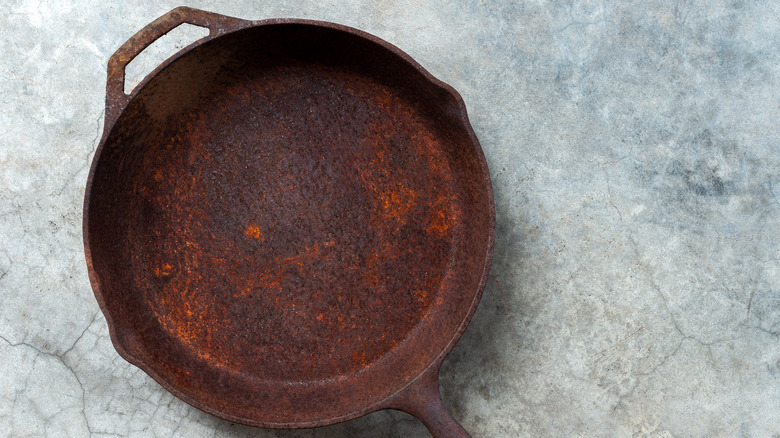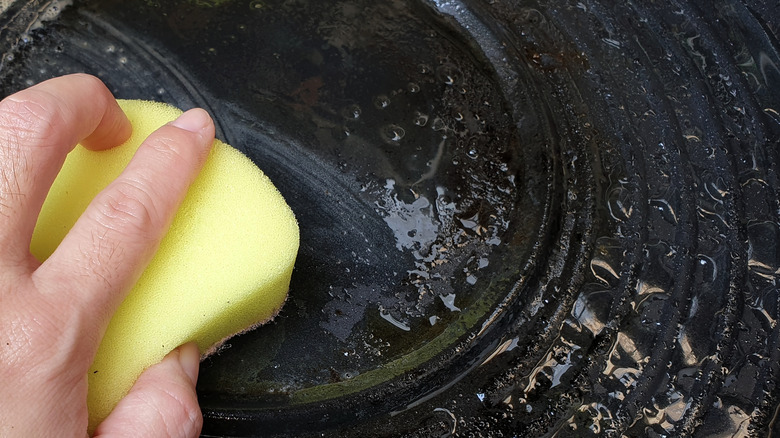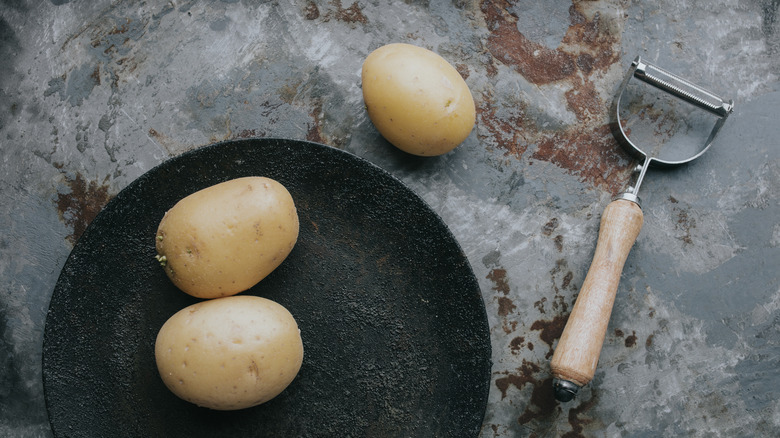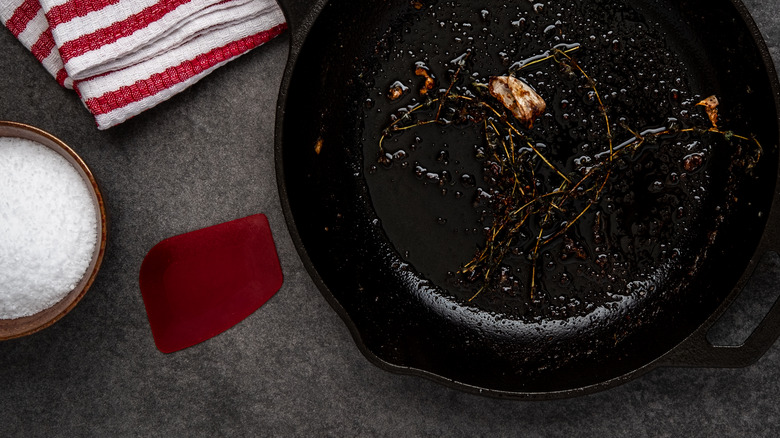How To Remove Rust From A Cast Iron Skillet
The truth about cast iron pans is that most of the slightly intimidating rules about handling them properly are all concerned with preserving the seasoning layer above all else. You should never soak an unrusted cast iron skillet or use harsh detergents and sponges on a properly seasoned cast iron pan. But once it starts rusting — whether from humidity while in storage or not being dried properly after cleaning — all those rules go right out the window. Your only option is to give it a good scrub to get the rust off and give it a fresh coat of seasoning.
However, that doesn't necessarily mean you need to bust out the steel wool and get ready for a workout. While a hard scrub with soap and any kind of tough abrasive material is a reliable way to get the rust off of cast iron pans, it's not the only viable option. If you want to skip an impromptu arm day or are just looking to keep soaps off of your cast iron as a general rule, there are a handful of effective natural solutions that'll give you an easier time: good old vinegar, coarse salt, baking soda, and, surprisingly, a potato.
Use a vinegar soak to coax off the rust
The first method is the most obvious and traditional one. If you're a frequent cook, chances are you've had to soak a rusted tool in vinegar to soften the rust before scrubbing it off once or twice before. This technique works just as well on cast iron as it does on any other metal. The only caveats are that you'll want to dilute the vinegar so that it doesn't eat away at the iron under the rust, and you also don't want to leave it soaking for too long and expose it to the risk of even more rusting. While the most straightforward approach, this is also the method that requires the most care, as soaking your pan for too long can cause long-term damage.
Start by preparing a tub big enough to accommodate your skillet or thoroughly clean and plug your sink, then fill your tub or sink with enough vinegar to completely submerge your skillet. After an hour, pull the pan out and scrub it with a non-abrasive sponge to coax away the rust. If it doesn't come off, let it soak for another five minutes, then repeat. Once it's clean and ready to go, give the pan a thorough rinse to make sure all of the vinegar is washed off. Follow the rinse with an equally thorough drying, then add a fresh coat of seasoning.
Use baking soda and a potato to wipe off the rust
Baking soda is a good alternative to vinegar to help pry the rust off of cast iron. The trusty, all-natural combination of baking soda and vinegar is useful for many other types of cleaning, but the chemical reaction can be too strong for cast iron and end up hurting its longevity. Instead of vinegar, try using the moisture from a sliced potato to help the baking soda along. It's as simple as cutting a potato in half, dipping the open end in baking soda, then rubbing the rusted parts like you would with a sponge.
The reason it works despite seeming like it shouldn't do much is because of the presence of oxalic acid in the potato. The mild acidity does very little on its own but adds just the right amount of extra help to baking soda (or soap) when it comes to easing rust off of cast iron without damaging the metal too much. If you feel the potato drying out during the scrubbing process, simply cut a thin slice off the end to keep it fresh, re-coat it in baking soda, and continue rubbing.
Use coarse salt for an effective scrub
Baking soda and soap aren't the only cleaning partners that a potato works well with. You can also dip a cut potato in coarse kosher salt to achieve roughly the same effect. It might take a little more scrubbing due to the lack of the more intense chemical reactions that usually loosen up rust, but it's a great alternative if you really want to stick to 100% edible, all-natural cleaning agents that won't damage your cast iron.
Don't have a potato? Try using a sliced lemon dipped in salt instead — all you're really aiming for is to add a natural, acidic source of moisture to wet the rust and chip away at it a little. To boost the effect, you can coat the cast iron skillet with coarse salt and leave it overnight to soak up any odors and other undesirable elements. Then, grab your choice of non-abrasive scrubber and start working off the rust. As with the other methods, don't forget to rinse and dry thoroughly before re-seasoning your pan — it's also not a terrible idea to give your skillet a dry bake before you start coating. If all else fails, don't be afraid to take the old reliable approach of using soap and steel wool or a chain mail scrubber.



